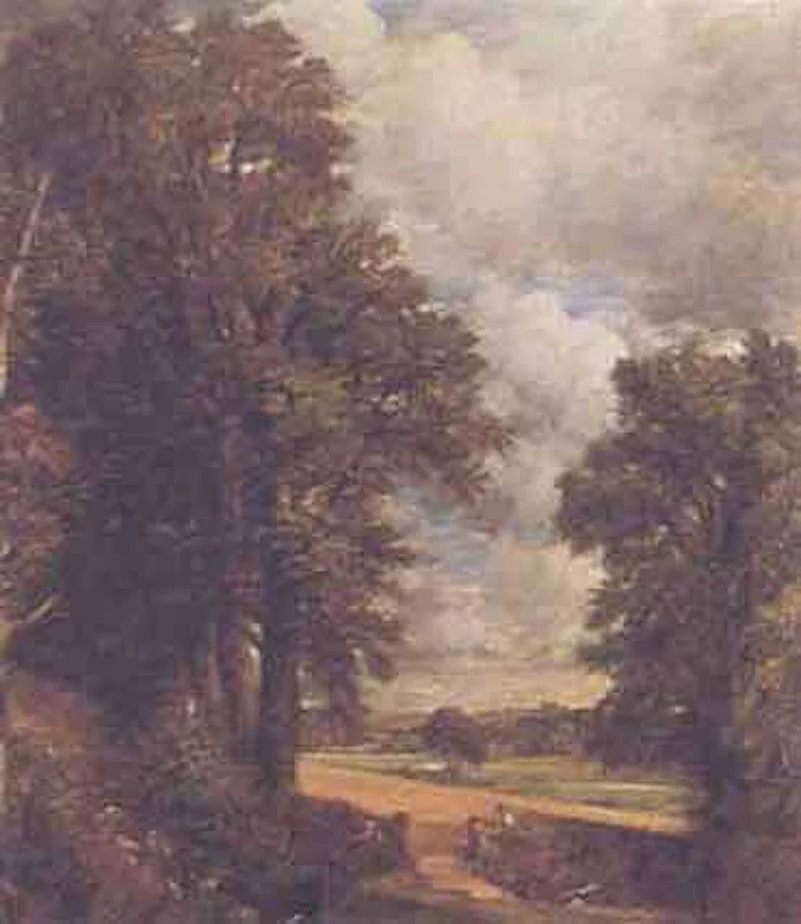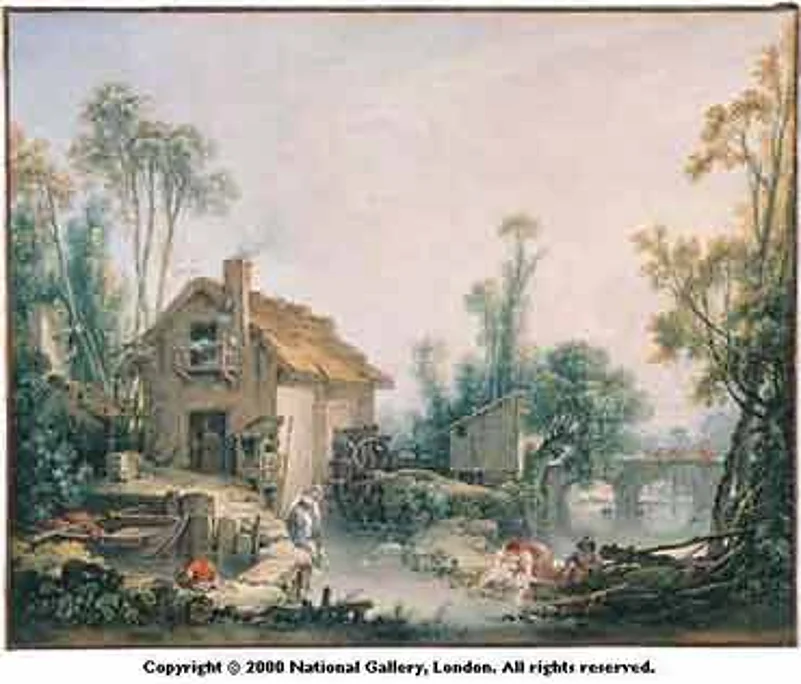
It is surely one of the most brazen evasions of reality ever painted. John Constable's The Cornfield,completed in 1826, and now hanging in the National Gallery's new exhibition Paradise, evokes, at thevery height of the enclosure movement, a flawless rural harmony. Just as the commoners were being dragged fromtheir land, their crops destroyed, their houses razed, the dissenters transported or hanged, Constableconjures the definitive English Arcadia. A dog walks a herd of sheep into the deep shade of an August day. Aruddy farm boy drinks from a glittering stream, his donkeys browsing quietly behind him. In the background,framed by great elms, men in hats and neckerchiefs work a field of wheat. Beyond them a river shimmers throughwatermeadows. A church emerges from the trees to bless the happy natives and their other Eden.
Advertisement
In the midst of the rural hell, Constable invents his heaven. It is a glittering lie, and we should not besurprised to read in the gallery's brochure that this is "one of the nation's favourite paintings,reproduced countless times and in thousands of homes".[1] For what Constable has done is what humanbeings have always done, and continue to do today. Confronted by atrocities, we invoke a prelapsarian wonder.We construct our Gardens of Eden, real or imagined, out of other people's hell.
The timing of the exhibition is good, as it is in this season that we leave our homes in search ofparadise. In doing so, we immiserate other people. It is not just the noise with which we fill their liveswhile pursuing our own tranquility. In order to create an Eden in which we may disport ourselves in innocenceand nakedness, we must first commission others to clear its inhabitants out of the way. Like Constable, we areadept at hiding this truth from ourselves.
Advertisement
The Yosemite Valley in California was set aside by Abraham Lincoln as the world's first public wilderness.As the historian Simon Schama records, "the brilliant meadow floor which suggested to its first eulogistsa pristine Eden was in fact the result of regular fire-clearances by its Ahwahneechee Indian occupants".[2] The first whites to enter the valley were the soldiers sent to kill them.[3] Eden, in an inversion of theBiblical story, was thus created by Man's expulsion. The colonists redefined the Ahwahneechee's managedhabitat as wilderness in order to assert both a temporal and spiritual dominion over it.
America's Garden of Eden, in other words, is in fact its Canaan, the land of milk and honey whoseindigenous people had first to be eliminated before the invaders could claim it as their birthright. TheMosaic doctrine of terra nullius (the inhabitants possess no legal rights to their land), which permitted theLord's appointed to "smite the corners of Moab, and destroy all the children of Sheth" [4] hasbecome the founding creed of the usurper all over the world. It continues to inform the land seizures inmodern Israel, seeking now to turn itself into a walled garden; it continues to guide the expropriations uponwhich much of the global tourism industry is based.
In the second half of the 20th century, as the cost of international transport fell, governments discovereda powerful financial incentive to create, from the lands of the poor, a paradise for the rich. All over eastand southern Africa, the most fertile lands of the nomads and hunter-gatherers were declared "primordialwilderness". [5] The inhabitants were shut out; only those who could afford to pay were permitted to enterheaven. You can read about the Maasai Mara reserve on the Kenya Tourist Board's website, under the heading"Wilderness". It informs you that the indigenous people, the Maasai, "regard themselves ... asmuch a part of the life of the land as the land is part of their lives. Traditionally, the Maasai rarely huntand living alongside wildlife in harmony is an important part of their beliefs." [6] What it does nottell you is that the Maasai have been extirpated from the "wilderness" in which they lived inharmony with wildlife, because the tourists did not expect to see them there.
Advertisement
The government of Botswana has just completed its expulsion of the Gana and Gwi Bushmen from the CentralKalahari Game Reserve, on the grounds that their hunting and gathering has become "obsolete" andtheir presence is no longer compatible with "preserving wildlife resources".[7] To get rid of them,as Survival International has shown, it cut off their water supplies, taxed, fined, beat and tortured them. [8]Bushmen have lived there for some 20,000 years; the wildlife is not threatened by them, but the freedom of thediamond mining and the tourism industries might be. Having expelled the Bushmen from their ancestral lands,the government now invites tourists to visit what its website calls "the Last Eden".[9]
Advertisement
The precursors of these game reserves were the deer parks and other earthly paradises the aristocracy builtfor itself in Britain. In Stowe gardens in Buckinghamshire, landscaped by Capability Brown in the 1740s onbehalf of the Whig politician Lord Cobham, is a valley called the "Elysian Fields", the paradise ofthe ancient Greeks. Hidden in the trees in the heart of paradise is a church: the only remaining evidence ofone of the villages cleared to make way for the estate. You can scour the National Trust's literature for anyreference to the people who lived there or in the other places which were turned into the grand estates itpreserves, but you will be wasting your time.[10] Britain's biggest NGO recounts the history of heaven, butshields its eyes from hell.
Advertisement
We deceive ourselves by precisely the same means in building our virtual Edens. Paul Gauguin sought hisgarden of innocence in the South Pacific, but found instead a society ravaged by French colonisation andvenereal disease. Like Constable he painted paradise anyway: the tableau displayed in the National Gallery waslargely copied from a frieze in a Javanese temple, into whose implausible Eden Gauguin inserted his etherealTahitians.[11]

Perhaps the most disturbing painting in the exhibition is Francois Boucher's Landscape witha Watermill. In the French countryside in 1755, the peasants were living on husks, grass and acorns, butBoucher has plump maids in white linen sauntering through their tasks, while boys lounge in bucolic splendouron the riverbank. The painting appears to have been produced to grace the walls of a landowner's home. Today,we find such lies repeated on our television screens, in the travel and wildlife programmes which seek topersuade us that all is well in the white man's playground. The BBC's only recent series on the Congo, filmedin the midst of the massacres there, informed us that "the Congo may once have been known as the 'heartof darkness' - today it seems more like a bright, beautiful wilderness."[12] It ignored the killingsaltogether.
Advertisement
Paradise is the founding myth of the colonist. Unable to contemplate the truth of what we do, we extractfrom our fathomless collective guilt a story of primordial innocence.
www.monbiot.com
References:
1. Sheena Stoddard, 2003. Paradise. The National Gallery.
2. Simon Schama, 1996. Landscape and Memory. Fontana, London.
3. The Yosemite Valley
4. Numbers 24, 17.
5. Bernhard Grzimek, Michael Grzimek, E L Rewald, 1965. Serengeti Shall Not Die. Collins, London.
6. KenyaTourist Board
7. The government of Botswana
8. Survival International, 22 February 2002. News Release: Botswana Leaves Bushmen In Desert Without Water;Survival International, 14 February 2002. News Release: Botswana Tortures Bushmen, Then Prosecutes Them;Survival International 30 January 2002. News Release: Botswana: Government Plans To Destroy Bushman Tribes.
9. The government of Botswana
10. See eg NationalTrust
11. Sheena Stoddard, ibid.
12. BBC
Advertisement
All web addresses current at the time of posting article.




















